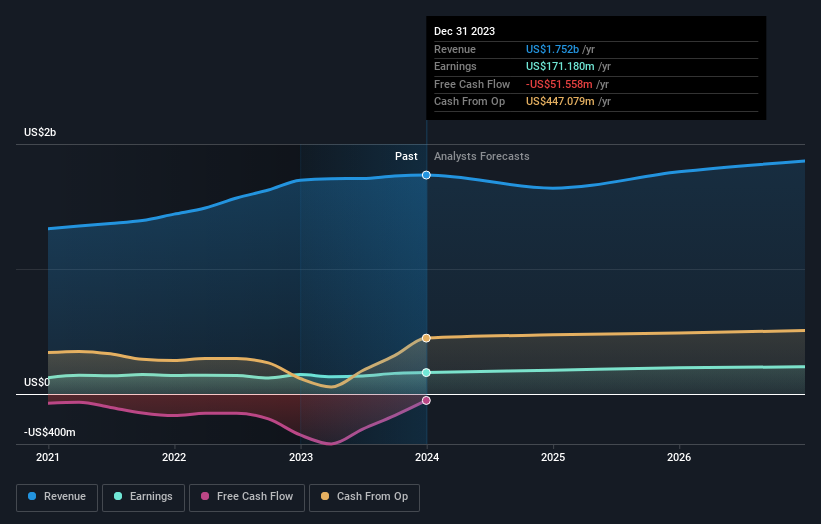Avista Corporation (NYSE:AVA) Just Released Its Yearly Earnings: Here's What Analysts Think
Avista Corporation (NYSE:AVA) came out with its annual results last week, and we wanted to see how the business is performing and what industry forecasters think of the company following this report. Revenues of US$1.8b were in line with forecasts, although statutory earnings per share (EPS) came in below expectations at US$2.24, missing estimates by 2.5%. This is an important time for investors, as they can track a company's performance in its report, look at what experts are forecasting for next year, and see if there has been any change to expectations for the business. We've gathered the most recent statutory forecasts to see whether the analysts have changed their earnings models, following these results.
View our latest analysis for Avista
Following the recent earnings report, the consensus from four analysts covering Avista is for revenues of US$1.65b in 2024. This implies a small 6.0% decline in revenue compared to the last 12 months. Statutory earnings per share are predicted to expand 11% to US$2.43. Before this earnings report, the analysts had been forecasting revenues of US$1.77b and earnings per share (EPS) of US$2.44 in 2024. The consensus seems maybe a little more pessimistic, trimming their revenue forecasts after the latest results even though there was no change to its EPS estimates.
The consensus has reconfirmed its price target of US$37.00, showing that the analysts don't expect weaker revenue expectations next year to have a material impact on Avista's market value. The consensus price target is just an average of individual analyst targets, so - it could be handy to see how wide the range of underlying estimates is. The most optimistic Avista analyst has a price target of US$50.00 per share, while the most pessimistic values it at US$32.00. These price targets show that analysts do have some differing views on the business, but the estimates do not vary enough to suggest to us that some are betting on wild success or utter failure.
Taking a look at the bigger picture now, one of the ways we can understand these forecasts is to see how they compare to both past performance and industry growth estimates. These estimates imply that revenue is expected to slow, with a forecast annualised decline of 6.0% by the end of 2024. This indicates a significant reduction from annual growth of 6.2% over the last five years. By contrast, our data suggests that other companies (with analyst coverage) in the same industry are forecast to see their revenue grow 3.9% annually for the foreseeable future. So although its revenues are forecast to shrink, this cloud does not come with a silver lining - Avista is expected to lag the wider industry.
The Bottom Line
The most important thing to take away is that there's been no major change in sentiment, with the analysts reconfirming that the business is performing in line with their previous earnings per share estimates. On the negative side, they also downgraded their revenue estimates, and forecasts imply they will perform worse than the wider industry. Even so, earnings per share are more important to the intrinsic value of the business. The consensus price target held steady at US$37.00, with the latest estimates not enough to have an impact on their price targets.
Following on from that line of thought, we think that the long-term prospects of the business are much more relevant than next year's earnings. We have forecasts for Avista going out to 2026, and you can see them free on our platform here.
You should always think about risks though. Case in point, we've spotted 3 warning signs for Avista you should be aware of, and 1 of them is significant.
Have feedback on this article? Concerned about the content? Get in touch with us directly. Alternatively, email editorial-team (at) simplywallst.com.
This article by Simply Wall St is general in nature. We provide commentary based on historical data and analyst forecasts only using an unbiased methodology and our articles are not intended to be financial advice. It does not constitute a recommendation to buy or sell any stock, and does not take account of your objectives, or your financial situation. We aim to bring you long-term focused analysis driven by fundamental data. Note that our analysis may not factor in the latest price-sensitive company announcements or qualitative material. Simply Wall St has no position in any stocks mentioned.

